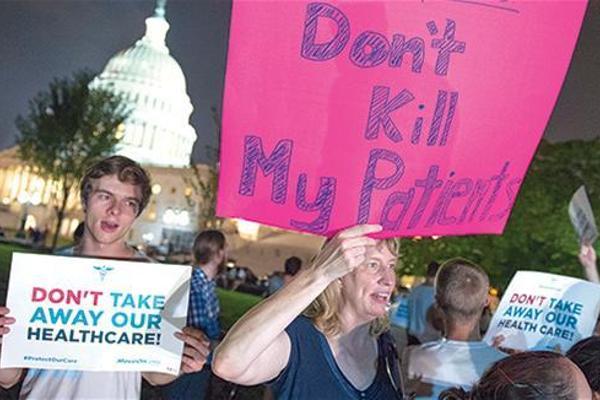Republicans’ Obamacare repeal bill fails in US Senate
WASHINGTON - Reuters


Voting in the early hours, three Republican senators, John McCain, Susan Collins and Lisa Murkowski, crossed party lines to join Democrats in a dramatic 49-to-51 vote to reject a “skinny repeal” bill that would have killed some parts of Obamacare.
“This is clearly a disappointing moment,” Senate Republican leader Mitch McConnell said on an eerily quiet Senate floor right after the vote.
“The American people are going to regret that we couldn’t find a better way forward.”
The setback leaves Trump without a major legislative win after more than six months in power, despite Republicans controlling the White House, Senate and House. It will also be a let-down for financial markets, which expected Trump to make rapid changes to healthcare, taxes and infrastructure spending.
“3 Republicans and 48 Democrats let the American people down. As I said from the beginning, let Obamacare implode, then deal. Watch!” Trump tweeted after the vote.
Trump has repeatedly berated congressional Republicans for being unable to overcome internal divisions to repeal Obamacare, but has offered no legislation himself, nor any clear guidance on what he would like to do about replacing the law.
The president has demanded at various times that Obamacare should be allowed to collapse on its own, that it should be repealed without replacement, and that it should be repealed and replaced.
The Affordable Care Act, approved by Democrats in 2010, is former Democratic President Barack Obama’s signature domestic achievement. It provided health insurance to millions of previously uninsured Americans.
Republicans hold 52 seats in the 100-seat Senate. McConnell, whose reputation as a master legislative tactician was on the line, could only afford to lose support from two Republican senators, with the tie-breaking vote to be cast by Vice President Mike Pence, who was on the Senate floor.
Republicans released the skinny bill just three hours before voting began. It would have retroactively repealed the Obamacare penalty on individuals who do not purchase health insurance, repealed for eight years a penalty on certain employers who do not provide employees with insurance and repealed a medical device tax until 2020. The nonpartisan Congressional Budget Office estimated that if it became law, 15 million fewer Americans would be insured in 2018 than under existing law.
As the vote approached, all eyes in the Senate chamber were on McCain. The former Republican presidential nominee and Vietnam war hero flew back from Arizona after being diagnosed with brain cancer in order to vote, and sat talking to Collins, Murkowski, and Republican Senator Jeff Flake, also from Arizona.
Collins and Murkowski both voted this week against more comprehensive Republican proposals to repeal and replace Obamacare and they were both known to have concerns about the pared-down proposal.
Trump had criticized Murkowski, tweeting that she had let down the Republican Party and the country.
McCain was then approached before voting began by Pence and Republican Senator Lindsey Graham, who had said on Thursday he would support the skinny repeal bill after reassurances from House Speaker Paul Ryan that it would not become law.
After speaking to Pence and Graham, McCain walked across the Senate floor to tell Senate Minority leader Chuck Schumer and other Democrats that he would vote with them. They laughed as McCain said that the reporters in the balcony could probably read his lips. Democratic Senator Dianne Feinstein embraced him.
When McCain walked to the front of the Senate chamber to cast his deciding “no” vote, giving a thumbs down, Democrats cheered, knowing the bill would fail.
After the bill’s defeat, Schumer told the Senate that it was time to heed McCain’s call this week to return to a more transparent and bipartisan legislative process.
Schumer told reporters that he and McCain had been talking four or five times a day this week about the pared-down bill and that McCain had made up his mind on Thursday afternoon. “John McCain is a hero,” Schumer said.
Democrats, and some Republicans, said the bill’s failure could present an opportunity for the two parties to work together to fix problematic areas of the Obamacare law without repealing it.
“We now have an opportunity to regroup and pull things together through an open and full committee process, bipartisan participation,” Murkowski told reporters.
Other Republicans said it was time to move on to other legislative priorities such as tax reform.
“This was a heavy lift. We should have taken our time. We should have first turned to tax reform and that’s what we’ll do now,” Republican Senator Ron Johnson told reporters.
IMF urges US to ‘protect’ gains won under Obamacare
The International Monetary Fund on July 27 waded into the U.S. health care debate, urging the Trump administration to “protect” gains achieved under President Barack Obama.
The IMF released its annual report on the U.S. economy and warned of potential damage threatened by the proposed replacement.
“Health care policies should protect those gains in coverage that have been achieved since the financial crisis (particularly for those at the lower end of the income distribution),” the IMF staff said in its Article IV report.
Maintaining those gains will help the US economy by increasing productivity and labor force participation, they said.
“This, in turn, will strengthen growth and job creation, reduce economic insecurity associated with the lack of health coverage, and have positive effects for the medium-term fiscal position,” the report said.
The IMF last month released the main points of the Article IV report, including cutting the growth forecast for the US economy 2.1 percent in 2017 and 2018, down from 2.3 percent and 2.5 percent, respectively.
